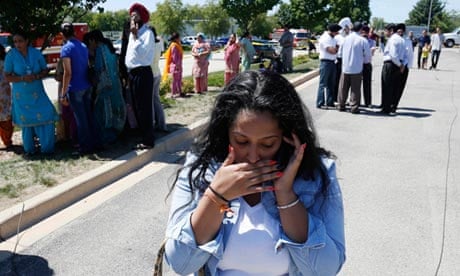"Why?" is the biggest and most impossible question to answer after an act of horrific violence, like the shooting in a Wisconsin Sikh temple last week that killed six innocent people. Though we may never understand the reasoning behind Wade Michael Bade's actions, we can try to consider how the tragedy will affect us as a society and how we can move forward.
We're collecting insightful commentary and analysis from journalists, writers, academics and reporters about different ways to think about the Wisconsin shooting. Tweet your recommendations, adding #smarttakes at the end, and we'll feature your contribution on this post.
Try it here:
Arsalan Iftikhar, CNN
Unless we acknowledge this attack on the Sikh temple as an act of terrorism, we will essentially be relegating brown-skinned Americans to second-class citizenry by perpetuating the myth that "terrorism" is only a Muslim, Arab or South Asian phenomenon and beyond the pale for any white person to commit.
To give another recent example, imagine that a brown Arab Muslim male tried to assassinate a member of Congress by shooting her in the head, killing six innocent people and wounding 13 others outside a grocery store during this assassination attempt.
Would we have any trouble calling this scenario above an act of terrorism? Nope.
Since authorities say the gunman was a white dude named Jared Lee Loughner, he was just a kooky loner whose mental health must have been the triggering factor. But if his name were Ali Akbar Nahasapeemapetilon, nobody in America would care a bit about his mental health issues.
Amardeep Singh, the Guardian
Still, there are rays of light in this tragedy. On Sunday, CNN and other print and broadcast outlets expended more constructive copy on Sikhs than I have ever witnessed. Journalists of all sorts rushed to explain the basic tenets of the Sikh religion and the practice of our faith. To be fair, the American Sikh community also has to do more to share our heritage with our neighbors. We need a more organized effort to persuade schools to teach children about their Sikh classmates, more meaningful interfaith outreach, and more well-known and accessible spokespeople.
Bhira Backhaus, the New York Times
The Sikh communities in California have flourished over the years. When I visit home now I am impressed by how comfortable the new generation seems in this country, whether they are developing advanced medical therapies for patients or dancing late into the night to bhangra beats. They have chosen to preserve their heritage while moving forward in the world.
But people still sometimes ask me, why can't they assimilate more? Dress like us. Talk like us. Perhaps, some seem to believe, that would prevent the sort of tragedy that happened in Wisconsin. I never have an easy answer. But I do know this: to wipe away what has come before, who we have been over the centuries, also means to forget who our own mothers and fathers were. It means that how they conducted their lives — the families they raised, the homes they built — didn't matter. It denies us that basic human impulse, to remember their stories, the unique timbre of their voices. It would be as if they had never existed at all.
Conor Friedersdorf, the Atlantic
Since 9/11, many Americans have conflated terrorism with Muslims; and having done so, they've tolerated or supported counterterrorism policies safe in the presumption that people unlike them would bear their brunt. (If Mayor Bloomberg and the NYPD sent officers beyond the boundaries of New York City to secretly spy on evangelical Christian students or Israeli students or students who own handguns the national backlash would be swift, brutal, and decisive. The revelation of secret spying on Muslim American students was mostly defended or ignored.)
Valarie Kaur, CNN
Whether or not the shooting in a Milwaukee suburb is a hate crime, the news has reverberated through every Sikh American home. We saw our own gurdwara on the television screen; we imagined our own aunts and uncles, brothers and sisters, caught in the gunfire. And we shared an all-too-familiar sense of helplessness, grief and the sadness of a community that has long struggled to live, work and worship peacefully in this country.
But this time, something new happened: The whole nation paid attention. Thousands of people posted messages of love and support in the face of unspeakable tragedy. They knew that the Sikh community gathered to pray on a Sunday morning just like millions in churches across the country. They knew that the terrible loss of life so recently after the shootings in Aurora shocks the conscience and violates our deepest values. They knew that this is not a Sikh tragedy but an American tragedy.
Hold the victims constant and give the perpetrator the last name Mohammed. Does anyone think for a moment that such an attack wouldn't still be the most discussed story at Fox News and National Review? And at various network news shows and unaffiliated newspapers for that matter?
Vijay Prashad, Counterpunch via @VijayPrashad
The attack on Sikhs is not a mistaken attack. Sikhs are not mistaken for Muslims, but seen as part of the community of outsiders who are, as Patrick Buchanan puts it in States of Emergency: The Third World Invasion and Conquest of America, "a fifth column inside the belly of the beast…Should America lose her ethnic-cultural core and become a nation of nations, America will not survive."

Comments (…)
Sign in or create your Guardian account to join the discussion